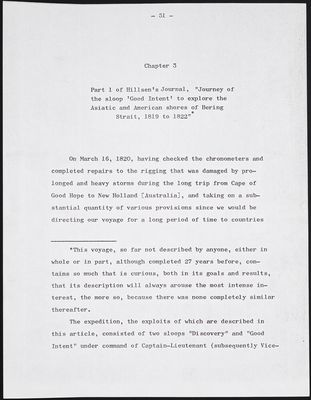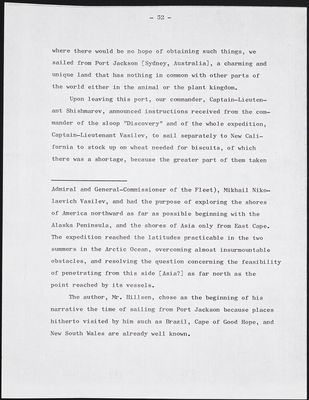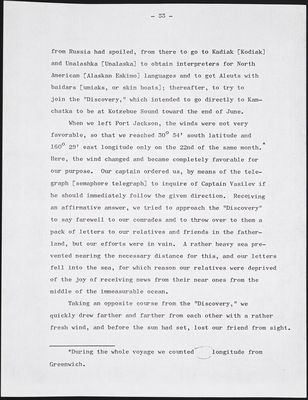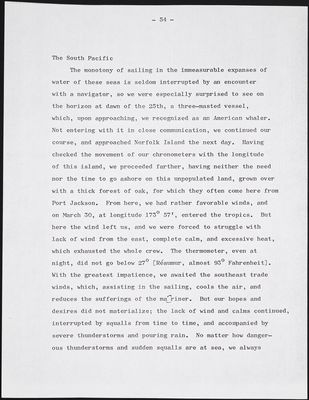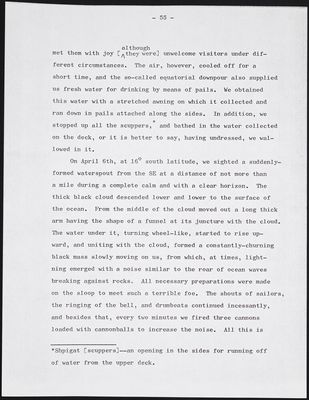Pages
mss142-vasilevShishmarev-i3-001
– 51 –
Chapter 3
Part 1 of Hillsen's Journal, "Journey of the sloop, 'Good Intent' to explore the Asiatic and American shores of Bering Strait, 1819 to 1822"*
On March 16, 1820, having checked the chronometers and completed repairs to the rigging that was damaged by prolonged and heavy storms during the long trip from Cape of Good Hope to New Holland [Australia], and taking on a substantial quantity of various provisions since we would be directing our voyage for a long period of time to countries ______ *This voyage, so far not described by anyone, either in whole or in part, althought completed 27 years before, contains so much that is curious, both in its goals and results, that its description will always arouse the most intense interest, the more so, because there was none completed similar thereafter.
The expedition, the exploits of which are described in this article, consisted of two sloops "Discovery" and "Good Intent" under command of Captain-Lieutenant (subsequently Vice-
mss142-vasilevShishmarev-i3-002
– 52 –
where there would be no hope of obtaining such things, we sailed from Port Jackson [Sydney, Australia], a charming and unique land that has nothing in common with other pars of the world either in the animal or the plant kingdom.
Upon leaving this port, our commander, Captain-Lieutentant Shishmarev, announced instructions received from the commander of the sloop "Discovery" and of the whole expedition, Captain-Lieutenant Vasilev, to sail separately to New California to stock up on wheat needed for biscuits, of which there was a shortage, because the greater part of them taken ______ Admiral and General-Commissioner of the Fleet), Mikhail Nikolaevich Vasilev, and had the purpose of exploring the shores of America northward as far as possible beginning with the Alaska Peninsula, and the shores of Asia only from East Cape. The expedition reached the latitudes practicable in the two summers in the Arctic Ocean, overcoming almost insurmountable obstacles, and resolving the question concerning the feasibility of penetrating from this side [Asia?] as far north as the point reached by its vessels.
The author, Mr. Hillsen, chose as the beginning of his narrative the time of sailing from Port Jackson because places hitherto visited by him such as Brazil, Cape of Good Hope, and New South Wales are already well known.
mss142-vasilevShishmarev-i3-003
- 53 -
from Russia had spoiled, from there to to to Kadiak [Kodiak] and Unalashka [Unalaska] to obtain interpreters for North American [Alascan Eskimo] languages and to get Aleuts with baidars [umiaks, or skin boats]; thereafter, to try to join the "Discovery," which intended to go directly to Kamchatka to be at Kotzebue Sound toward the end of June.
When we left Port Jackson, the winds were not very favorable, so that we reached 30[degree symbol] 54' south latitude and 160[degree symbol] 29' east longitude only on the 22nd of the same month. * Here, the wind changed and became completely favorable for our purpose. Our captain ordered us, by means of the telegraph [semaphore telegraph] to inquire of Captain Vasilev if he should immediately follow the given direction. Receiving an affirmative answer, we tried to approach the "Discovery" to say farewell to our comrades and to throw over to them a pack of letters to our relatives and friends in the fatherland, but our efforts were in vain. A rather heavy sea prevented nearing the necessary distance for this, and our letters fell into the sea, for which reason our relatives were deprived of the joy of receiving news from their near ones from the middle of the immeasurable ocean.
Taking an opposite course from the "Discovery," we quickly drew farther and farther from each other with a rather fresh wind, and before the sun had set, lost our friend from sight.
*During the whole voyage we counted longitude from Greenwich.
mss142-vasilevShishmarev-i3-004
- 54 -
The South Pacific
The monotony of sailing in the immeasurable expanses of water of these seas is seldom interrupted by an encounter with a navigator, so we were especially surprised to see on the horizon at dawn of the 25th, a three-masted vessel, which, upon approaching, we recognized as an American whaler. Not entering with it in close communication, we continued our course, and approached Norfolk Island the next day. Having checked the movement of the chronometers with the longitude of this island, we proceeded farther, having neither the need nor the time to go ashore on this unpopulated land, grown over with a thick forest of oak, for which they often come here from Port Jackson. From here, we had rather favorable winds, and on March 30, at longitude 17°57', entered the tropics. But here the wind left us, and we were forced to struggle with lack of wind from the east, complete calm, and excessive heat, which exhausted the whole crew. The thermometer, even at night, did not go below 27° [Réaumur, almost 93°Fahrenheit]. With the greatest impatience, we awaited the southeast trade winds, which, assisting in the sailing, cools the air, and reduces the sufferings of the mariner. But our hopes and desires did not materialize; the lack of wind and calms continued, Interrupted by squalls from time to time, and accompanied by severe thunderstorms and pouring rain. No mater how dangerous thunderstorms and sudden squalls are at sea, we always
mss142-vasilevShishmarev-i3-005
-- 55 --
met them with joy [although they were] unwelcome visitors under different circumstances. The air, however, cooled off for a short time, and the so-called equatorial downpour also supplied us fresh water for drinking by means of pails. We obtained this water with a stetched awning on which it collected and ran down in pails attached along the sides. In addition, we stopped up the scuppers, * and bathed in the water collected on the deck, or it is better to say, having undressed, we wallowed in it.
On April 6th, at 16[degree symbol] south latitude, we sighted a suddenlyformed waterspout from the SE at a distance of not more than a mile during a complete calm and with a clear horizon. The thick black cloud descended lower and lower to the surface of the ocean. From the middle of the cloud moved out a long thick arm having the shape of a funnel at its juncture with the cloud. The water under it, turning wheel-like, started to rise upward, and uniting with the cloud, formed a constantly-churning black mass slowly moving on us, from which, at times, lightning emerged with a noise similar to the roar of ocean waves breaking against rocks. All necessary preparations were made on the sloop to meet such a terrible foe. The shouts of sailors, the ringing of the bell, and drumbeats continued incessantly, and besides that, every two minutes we fired three cannons loaded with cannonballs to increase the noise. All this is
______________ *Shpigat [scuppers] -- an opening in the sides for running off of water from the upper deck.
